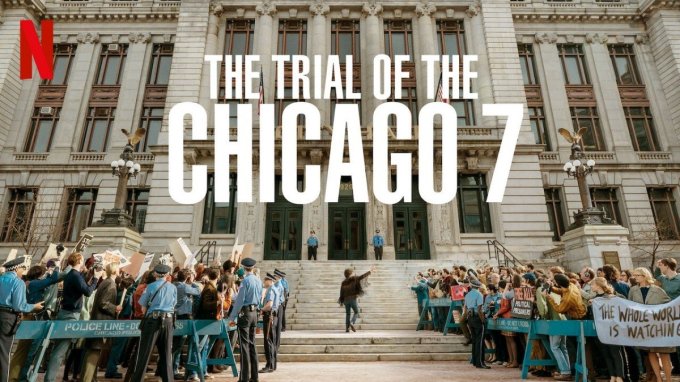July, August, September, 1968 were, in retrospect, tumultuous times. There had been student rights and protest at the Sorbonne, Paris. There were significant battles in the Vietnam war. There was the ill-feted Prague Spring. There was controversy in the Catholic Church with the issuing of the papal encyclical, Humanae Vitae. And there were protests in the United States, protests against the draft, the 1968 elections.
Some of the characters involved in the protests at the Democratic convention were significant figures of the time but have lived on in memory, Tom Hayden, Abbie Hoffman, Jerry Rubin, and the inclusion of Bobby Seale of the Black Panthers who spent only four hours in Chicago, sustained a false murder accusation against him in Connecticut, and was, for political reasons, included in the group who were indicted, The Chicago 7. Their long trial at the end of 1968, caused controversy – and became something of a pattern for protests in the ensuing years as well as political trials (think In the King of Prussia, the trial of Daniel Berrigan SJ and other protectors against nuclear armament – and who all appeared in the film version.)
This film has been written and directed by Aaron Sorkin. He is possibly best known for his creation of the television series, The West Wing. However, he was also responsible for such films as A Few Good Men, The Social Network, Moneyball, Molly’s Game, the series, The Newsroom and, on a lighter note, The American President. Clearly, these historical events are important for his historical American memory and evaluation.
The audience is invited to have sympathies for the protest leaders rather than for Mayor Daley of Chicago and his orders to forbid any protest, for the exercise of police brutality, for the status of the judge who is prone to bullying the defendants and their lawyers, prone to citing for contempt.
The major part of the screenplay is set in the court. However, the film introduces its theme with three symbolic talking heads, Lyndon Johnson on Vietnam and the draft, Martin Luther King and his vision (and his assassination), the hopes of Robert Kennedy (and his assassination) and close-ups of the exercise of the draft and its effect on the young men who are to go to Vietnam.
The screenplay also introduces the characters of the seven, brief sketches so that we know who each of the men is and something of their style (and appearances). Eddie Redmayne reminds us of his versatility and performance, playing the young Tom Hayden, with his friend Rennie Davis, played by Alex Sharp. Then there is the middle-aged conscientious objector, seen with his wife and his admiring young son, David Dellinger, played by John Carroll Lynch. There are two younger objectors who do not feature so strongly, played by John Froines and Lee Weiner. The two characters who stand out immediately are Abbie Hoffman and Jerry Rubin, long hair, hippie-style, Hoffman with a talent for wit and repartee, Rubin committed but a touch of the comic. It comes as quite a surprise to realise that Abbie Hoffman is being played by Sasha Baron Cohen, Rubin by the star of Succession, Jeremy Strong. Yahya Abdul Marteen II stands out as an impassioned Bobby Seale.
They are the seven. However, particularly striking are the performances of the judge and the lawyers. Frank Langella is absolutely convincing (and frequently obnoxious) as the presiding judge (whose dealing with the case is heavily criticised afterwards). Joseph Gordon Levitt is the suit and tie, always standing and buttoning his coat, counsel for the prosecution. Mark Rylance, less dapper, is the effective counsel for the defence. So much of the courtroom drama is in their hands.
There are scenes of the protests, a variety of flashbacks inserted throughout the film, groups demanding the right to protest, being denied, being attacked by the police, shields and batons and gas, to combat them.
In handling the case, the idea comes that the previous attorney general, Ramsey Clark, disliked by the Nixon attorney general, John Mitchell (who has to face his own legal challenges with Watergate) who had initiated the indictments, should testify in the case. He is played by Michael Keaton, willing to testify, stating that investigation into the riots and protests indicated police brutality. (The judge will not allow the jury to hear this testimony.)
And so, a film of 2020, looking at divisive American past experience, released during the campaign for the 2020 presidential election. A great deal to interest, performances and dialogue to enjoy, and plenty to challenge.
Reviewed by Fr. Peter Malone, MSC
US, 2020, 130 minutes, Colour.
Eddie Redmayne, Alex Sharp, Sasha Baron Cohen, Jeremy Strong, John Carroll Lynch, Yahya Abdul Mateen II, Mark Rylance, Joseph Gordon-Levitt, Ben Shankman, J.C.Mc Kenzie, Frank Langella, Danny Flaherty, Noah Robbins, Kelvin Harrison Jr, John Doman, Michael Keaton, Caitlin Fitzgerald.
Directed by Aaron Sorkin.
